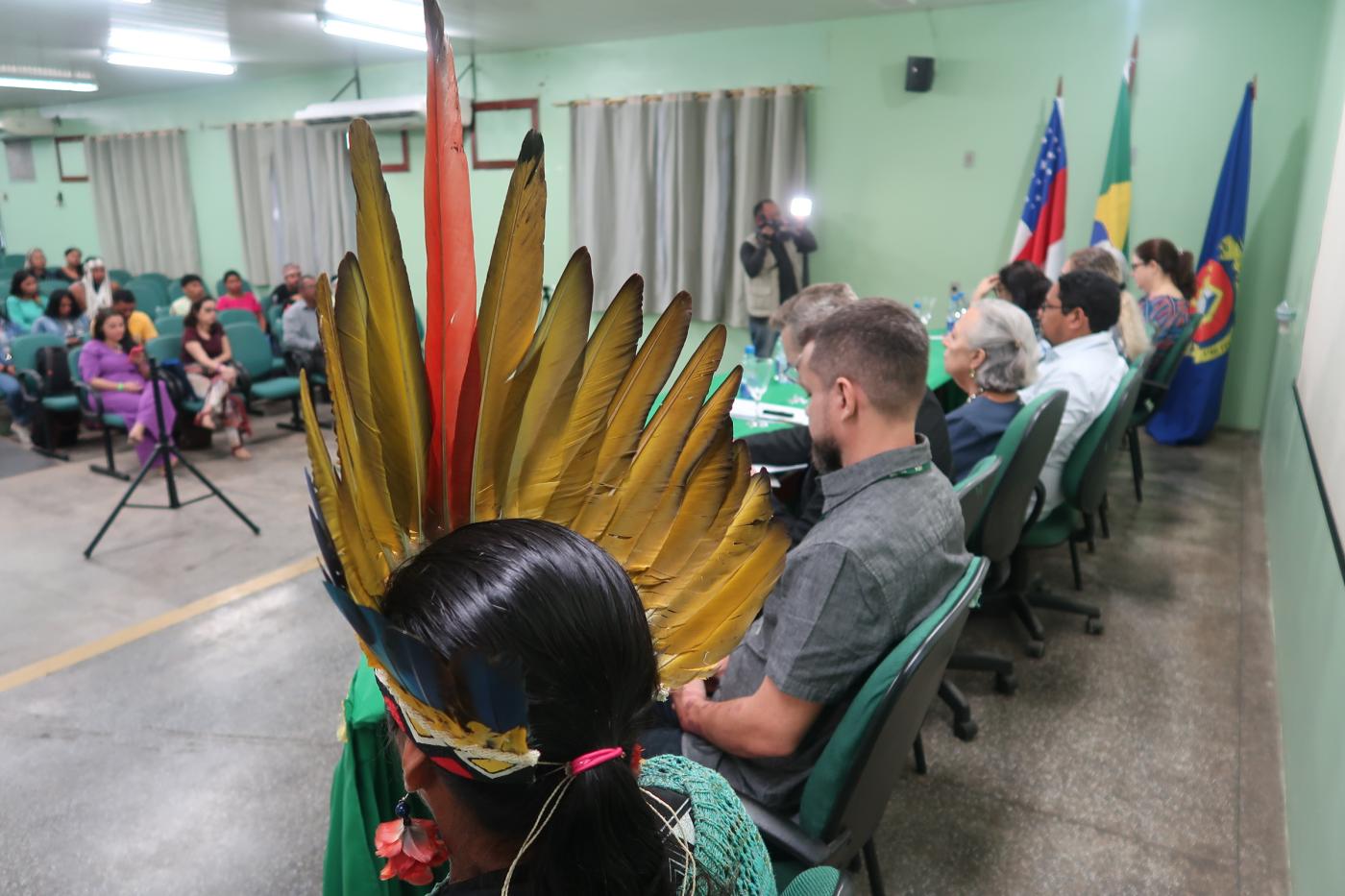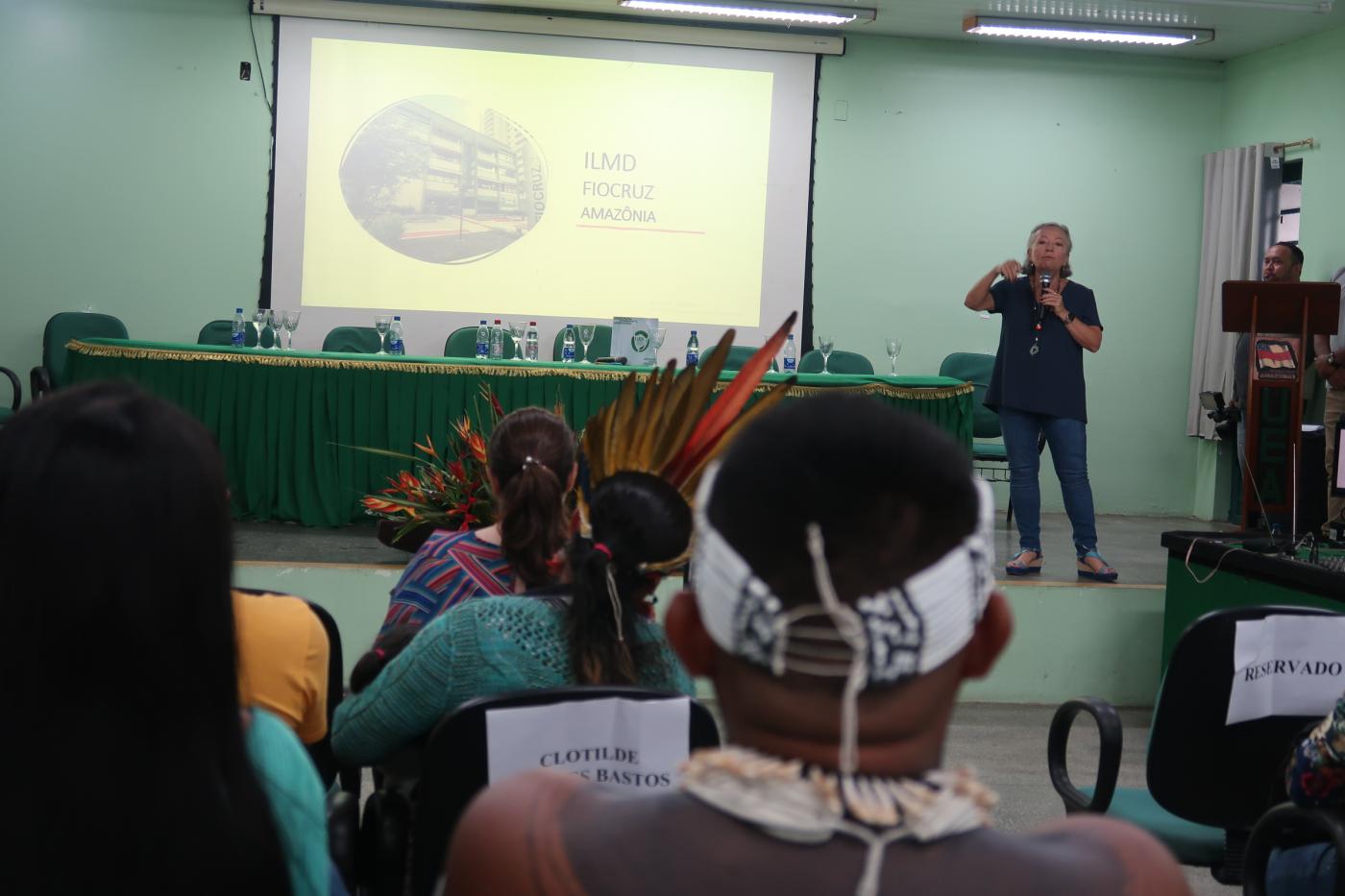Unprecedented Master's Degree in Collective Health for indigenous people reaffirms Fiocruz's commitment
16/08/2023
Júlio Pedrosa (Fiocruz Amazônia), with collaboration from Camile Duque Estrada (Fiocruz News Agency)
Fiocruz reaffirms its commitment and institutional policy to deepen affirmative and inclusive actions for the country's indigenous populations, through partnerships that offer access to education. The Leônidas & Maria Deane Institute (Fiocruz Amazônia) launched last Monday (8/14) the first master's degree course in Collective Health aimed exclusively at training indigenous professionals, teachers and researchers from Alto Solimões, as a way to reduce inequality in the most remote regions of the country.
The first class of the master's degree course in Collective Health for indigenous peoples (photo: Fiocruz Amazônia)
“This initiative by Fiocruz Amazônia is part of the Foundation's institutional policy. The master's degree aims to strengthen the Unified Health System (SUS) in the Amazon and provide students with the necessary training to develop research of interest to the region. Although we have affirmative actions at all levels and modalities of education at the Foundation, this class aimed specifically at indigenous peoples seeks to reduce inequalities from the perspective of educational training, offering subjects of relevance to this population group”, comments Cristina Guilam, general coordinator of education of the Vice-Presidency of Education, Information and Communication (VPEIC/Fiocruz).
The master's degree in Living Conditions and Health Situations in the Amazon was held last Monday (8/14), in the auditorium of the State University of Amazonas (UEA), in Tabatinga (Amazonas). The activity was taught by the director of Fiocruz Amazônia, Adele Schwartz Benzaken, who recently received the medal of the National Order of Scientific Merit, the highest honor in the field of Science, Technology and Innovation.
For Adele, the master's degree is a milestone in the history of Fiocruz Amazônia, in the process of internalizing continuing education, fulfilling a long-standing desire to overcome logistical challenges and offer qualification opportunities in remote areas of the Brazilian State of Amazonas. She also highlights the relevance of the course in the process of valuing traditional indigenous knowledge and in the opportunity to train indigenous health workers, a commitment made when she took over the management of the unit. “Without the key support from partners such as Fapeam, CNPQ and universities, it would not be possible to achieve this goal”, she highlights.
The unprecedented course, aimed exclusively at indigenous people from Alto Solimões, is the first master's degree in Collective Health with stricto sensu training to be held in the Extended Room modality, outside the headquarters of the Graduate Program in Living Conditions and Health Situations in the Amazon (PPGVIDA). There were 52 candidates from different ethnic groups and municipalities in the region who submitted to the selection process of the course, resulting in the filling of the 15 vacancies offered for indigenous health officers. Vacancies were filled by tikunas, kambebas, kaikanas, marubos, kokamas and kanamaris, from the municipalities of Tabatinga, Benjamim Constant, Atalaia do Norte, Amaturá and Santo Antônio do Içá.
The students are from different ethnic groups, as tikunas, kambebas, kaikanas, marubos, kokamas and kanamaris (photo: Fiocruz Amazônia)
To carry out the course, adaptations were necessary to meet the cultural and social singularities of indigenous peoples living in the Amazon. The preparatory stage included a course on Ethnicity, Sustainability and Collective Health in the Triple Frontier of the Amazon, with a course load of 200 hours.
The result of a joint effort between educational and research institutions, the course is coordinated by the professor and researcher in Public Health at Fiocruz Amazônia, Luiza Garnelo. “The objective is to qualify indigenous undergraduates in various areas of knowledge so that they can work in the field of collective health and develop activities, working in the institutions within the region and contributing to improving the provision of indigenous health services and in the municipality's own primary care. As an indigenous health officer, professionals can act in a qualified manner in the implementation of monitoring, assessment, health surveillance and investigative processes that are necessary to subsidize and improve the quality of health actions, she explains.
Fiocruz Amazônia hopes, with the first master's degree class aimed at indigenous people, to consolidate the project to internalize graduation actions in the area of collective health, in areas of difficult access and remote border regions. The expectation is that students will be able to qualify to develop collective health activities and work in institutions in the region.
The Fiocruz Amazônia initiative has the support of the State University of Amazonas (UEA), funding from the Foundation for Research Support of the State of Amazonas (Fapeam) - which granted 15 scholarships plus resources for research assistance to the approved indigenous people -, and the National Council for Scientific and Technological Development (CNPQ), through a project approved by the Ministry of Science, Technology and Innovation.
Read more: Fiocruz reaffirms engagement in favor of equity, diversity and inclusion


